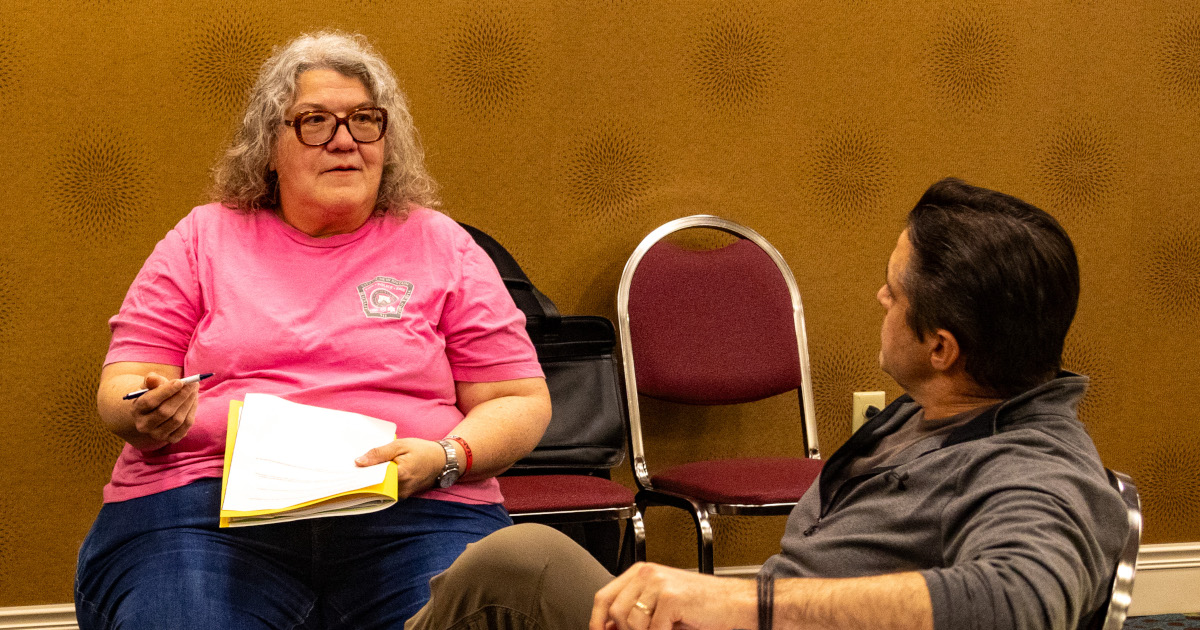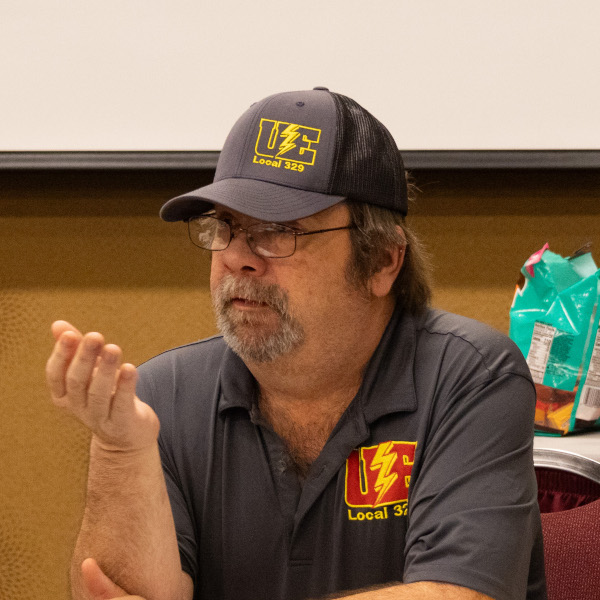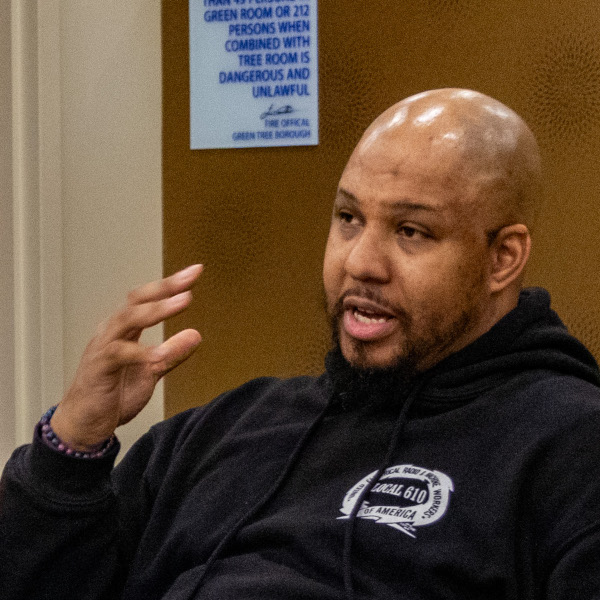“No one is born saying I want to be a union president,” Local 506 President Scott Slawson reminded his fellow members of UE’s General Executive Board during the board’s meeting on January 25 and 26. Throughout the two days, board members and national officers repeatedly emphasized the importance of giving UE members the skills to run their own local unions without relying on staff — and the measures that the National Union, and many locals, are taking to make that happen.
During the Education Report, General President Carl Rosen reported that he, Director of Organization Mark Meinster, and Slawson did an intensive training for the three top officers of new UE Local 256 (MIT-GSU), which recently settled a first contract covering 3,800 graduate workers at the Massachusetts Institute of Technology, on UE history and principles. “A week later,” Rosen said, “they brought in the other dozen members of their executive board, and they ran the training themselves.” Local 256 is now working with other locals on a nationwide educational program for UE’s new graduate worker members.
Members from Local 256 have also led trainings on strike assessments for members at both Local 1122-NUGW at Northwestern University and Local 1103-GSU at the University of Chicago. Both Chicago-area locals are approaching the critical moment in their negotiations for first UE contracts.
The strike-assessment trainings are part of a culture among UE’s new graduate worker locals of training each other, Rosen reported. The new locals are sharing experiences, developing common practices and materials, and building their capacity to wage militant fights
Graduate workers are also learning from established locals in other industries. Both Local 506 President Scott Slawson and Local 618 Business Agent Janet Gray played a role in training for Local 256’s new officers, and Local 1008 held a training for several graduate worker locals on Weingarten rights. (Locals 506 and 618 represent workers at the Wabtec locomotive plant in Erie, Pennsylvania; Local 1008 represents federal contract workers in Laguna Niguel, California.)
Meinster added that UE’s Service Contract Act (federal contract worker) locals meet semi-regularly, and that Locals 1008 and 728 recently held a training for other SCA locals on welcoming new members into the workplace. He said that the National Union is interested in supporting similar cross-local training opportunities: “It’s a lot more effective to have members training members.”

Margaret Dabrowski, Local 222, discussing how to engage members with Scott Slawson, Local 506.
On a similar theme, General Secretary-Treasuer Andrew Dinkelaker led an extensive discussion on Friday morning about how to maximize democratic participation by the locals in decision-making and elections at the national and regional level.
“The only way unions are going to grow substantially in this country”
Member-led activity was also a theme in Director of Organization Meinster’s Organizational Report. “Our model is becoming, more and more, putting power in the hands of the workers who are organizing [and] having staff help them,” he said. “That’s the only way unions are going to grow substantially in this country.” He noted that this past year, even with significant new organizing by UE and other unions, the percentage of unionized workers in the U.S. still dropped. The only way to reverse the decline in union density, Meinster said, is if “millions of union members” take a role in the organizing process.
He reviewed the progress being made towards first UE contracts at seven graduate worker locals across the country, the most recent of which, 3,200 workers at Cornell University in Ithaca, New York, joined UE in November. Like other UE graduate worker campaigns, the Cornell campaign was led by a strong organizing committee of the workers themselves, and they received assistance from other UE graduate worker locals.
However, graduate workers are not the only rank-and-file UE members taking a lead in bringing new members into the union. In Williamsburg, Kentucky, Local 728 President Kevin White helped a group of maintenance workers at the Kentucky Consular Center organize and win voluntary recognition from their employer, PacArctic.
In Virginia’s Tidewater region, Meinster reported, municipal workers from multiple cities recently gathered in Norfolk for a march on Dr. Martin Luther King, Jr. Day to demand collective bargaining.
“We’re fighting for the same rights for everybody, and the best way to do that is to have representation”
On Thursday afternoon, Meinster led a discussion about ways to make the union’s leadership more representative of both the membership and the working class more broadly. Board members broke into four groups to talk about four big questions: how to more actively encourage women and people of color to run for leadership positions; the challenges or barriers that might exist for women and people of color in seeking leadership roles within the union; training and mentorship programs; and steps to create a more inclusive and welcoming environment for all members.
In the discussion that followed, the UE leaders were forthright about the challenges facing women and people of color. Margaret Dabrowski, Local 222, pointed out that “girls are not encouraged to talk in school.” Jessica Van Eman, Local 1477, added that men’s voices are often listened to more than women’s voices. Diana Martinez, Local 1077, observed that as a Latina woman, there are “no others like me on this board.”
Scott Slawson, Local 506, said that “social bias” — racism, sexism, homophobia and transphobia — plays a role in discouraging people from running for office. “We can’t ignore the past, we can’t ignore what’s happening in the United States,” he said. “It’s about discussing it and having the conversation and then truly listening to each other as well, and you have to be willing to do that.”

Bud Decker, Local 329.
Bud Decker, Local 329, speculated that, in shops that are primarily white and male like his, women and members of color might think, “if I run for [a union position], they’re not going to vote for me.” He said, “I think we have to get that message out that if you run and you’re the right person for the job,” that UE members will support that candidate, regardless of race or gender.
Meinster acknowledged that “the culture of the union can be tough for people to enter into sometimes,” but GEB members offered a number of creative suggestions to help welcome members into the union. Dabrowski suggested getting more information into the shops about educational opportunities. Mike Tomaloff, Local 1186, reporting from his discussion group, suggested a video series of diverse UE members talking about why they are involved with the union. Antwon Gibson, Local 610, said that it is important to make sure current members know about UE’s history of fighting discrimination and uniting all workers. “That’s a big part of welcoming new members.”

Antwon Gibson, Local 610.
Eastern Region President George Waksmunski emphasized the importance of making sure all UE members understand that having a diverse and representative leadership is a key part of having a strong union. Slawson seconded this point, saying that “one of the conversations I’ve had to have with our own members [is] understanding that society, corporations, government, they want to put us in these little boxes” labeled by race, gender, sexual orientation and other identities. “The union is the opposite of that.”
Slawson concluded, “As a union we’re fighting for the same rights for everybody, and the best way to do that is to have that representation.”
Political Allies Under Attack
In his Political Action Report, President Rosen noted that close UE ally Congresswoman Summer Lee (D-PA), along with many other of the most pro-worker members of Congress, are under attack by deep-pocketed right-wing forces and will be facing well-funded opponents in their primaries this spring. Congressman Chuy Garcia (D-IL), another close UE ally, may also be facing a similar primary challenge. UE will be issuing a leaflet to make sure members know about Lee’s record of standing up for workers.
GEB members also discussed the dilemma that will face workers in the fall, as they will be forced to choose between the disappointing incumbent, Joe Biden, or Donald Trump, who has vowed to use the government to punish his perceived enemies if he is returned to office.
Brother Rosen reported on the development of the National Network for a Ceasefire. Nine national unions representing six million workers have now called for a ceasefire in Gaza, which Rosen pointed out is important both from a moral standpoint, and as a matter of practical politics: Biden’s unqualified support for Israel’s war is jeopardizing his own chances for re-election.
Meeting at the halfway point of the union’s fiscal year, the GEB carefully reviewed the union’s budget and finances. They also heard reports on the recently-completed second cohort of the Leadership and Staff Development Program and the upcoming UE Women’s Leadership Project, and renewed UE’s affiliations with the Labor Campaign for Single Payer and the global union federation IndustriALL.
